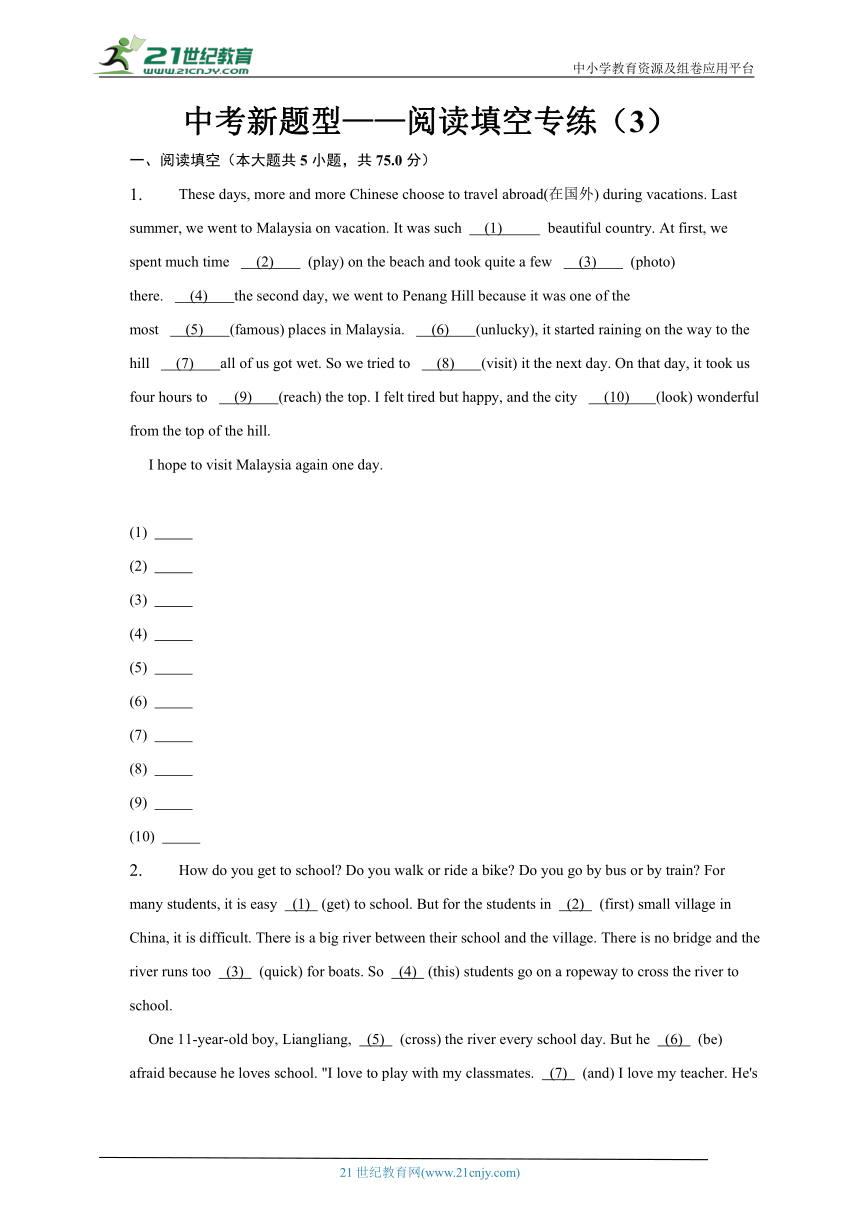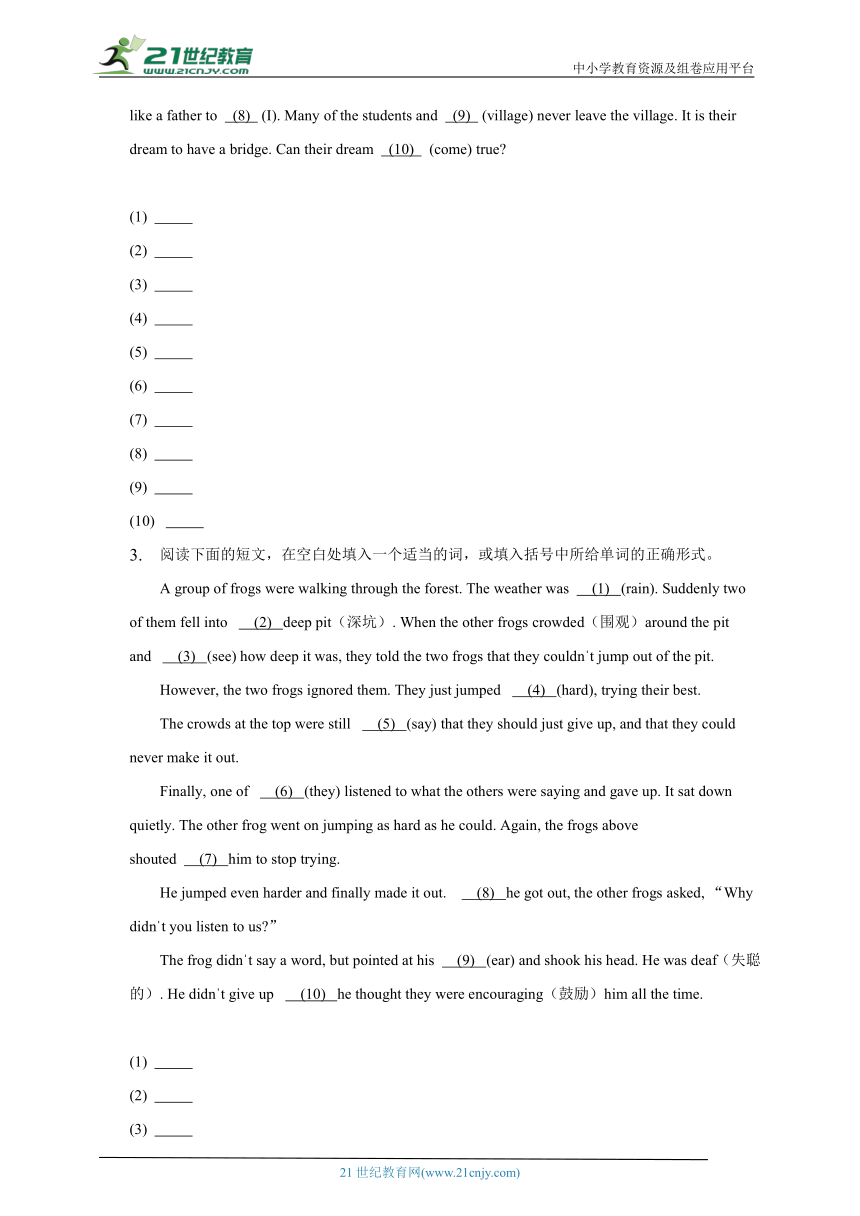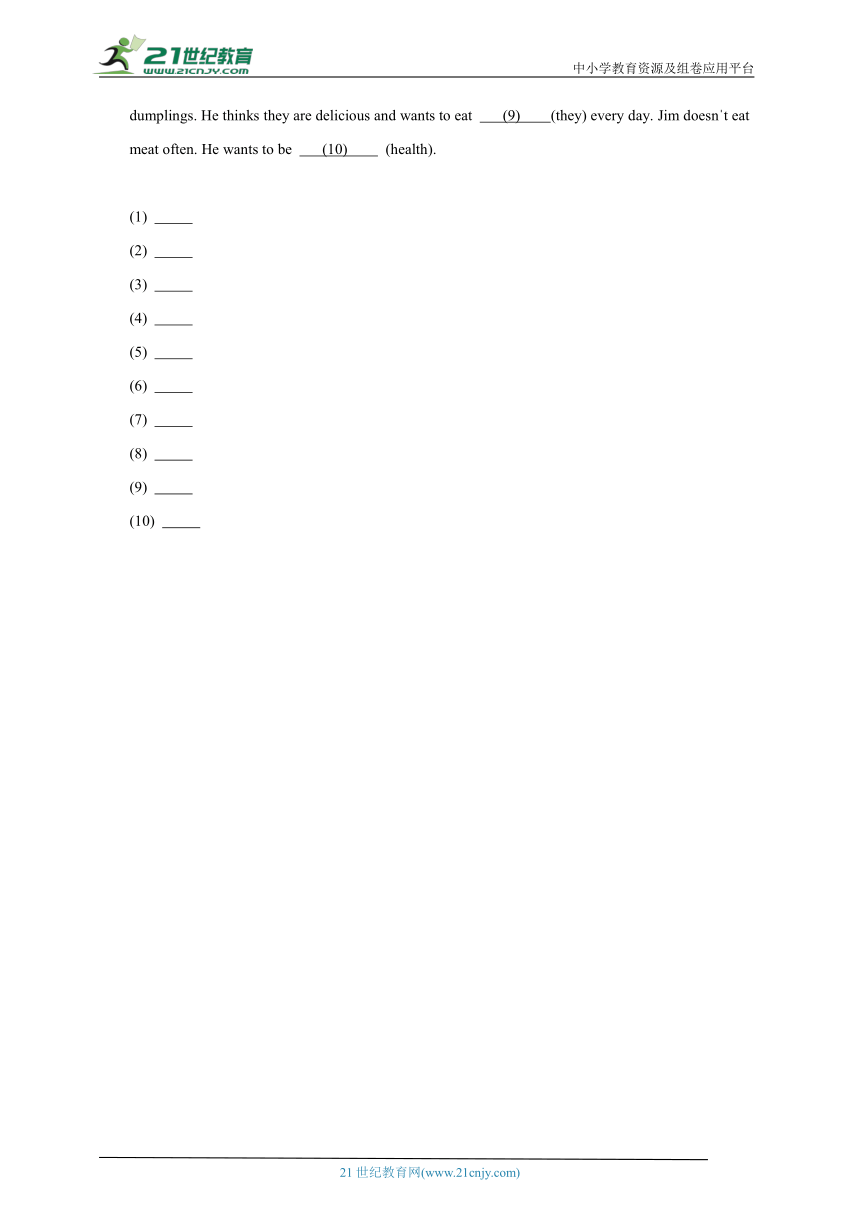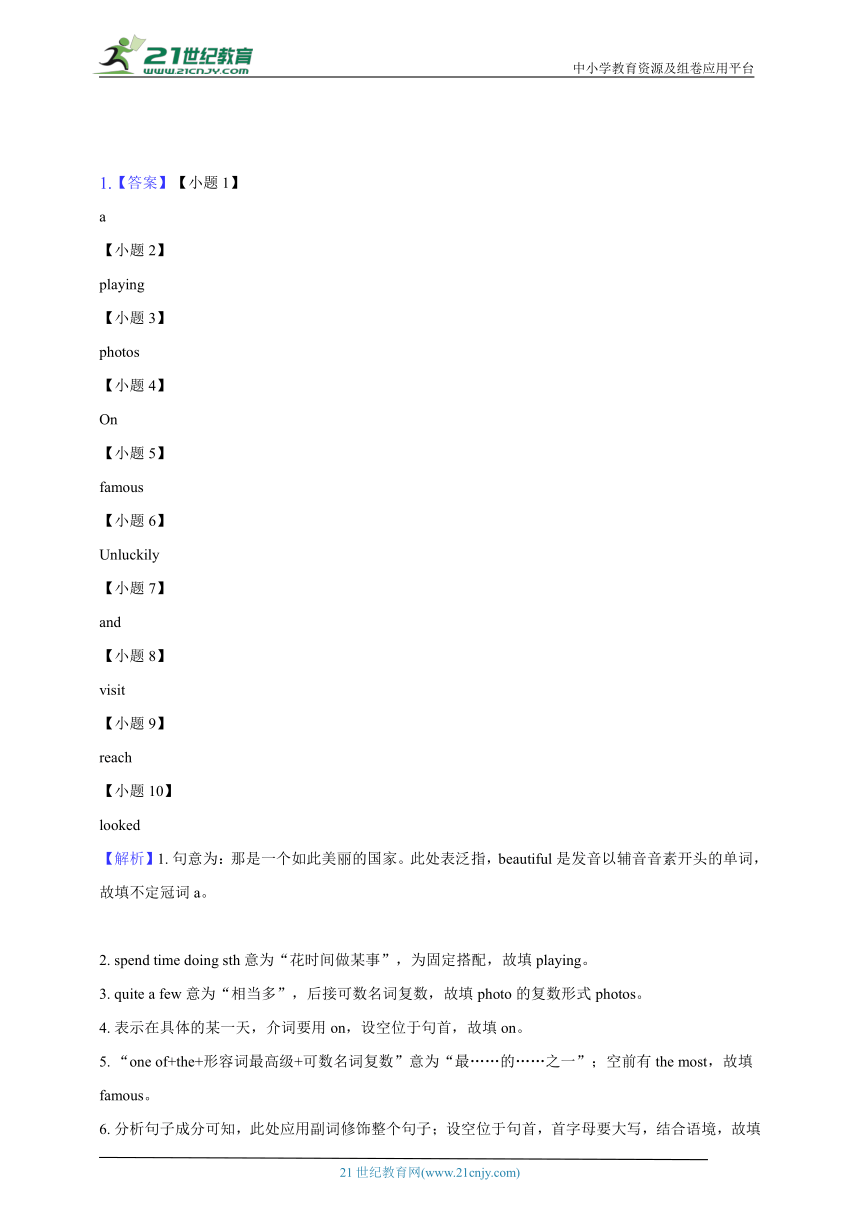中考英语新题型——阅读填空专练(3)(含解析)
文档属性
| 名称 | 中考英语新题型——阅读填空专练(3)(含解析) |  | |
| 格式 | doc | ||
| 文件大小 | 171.5KB | ||
| 资源类型 | 试卷 | ||
| 版本资源 | 人教新目标(Go for it)版 | ||
| 科目 | 英语 | ||
| 更新时间 | 2023-03-28 20:10:43 | ||
图片预览





文档简介
中小学教育资源及组卷应用平台
中考新题型——阅读填空专练(3)
一、阅读填空(本大题共5小题,共75.0分)
1. These days, more and more Chinese choose to travel abroad(在国外) during vacations. Last summer, we went to Malaysia on vacation. It was such (1) beautiful country. At first, we spent much time (2) (play) on the beach and took quite a few (3) (photo) there. (4) the second day, we went to Penang Hill because it was one of the most (5) (famous) places in Malaysia. (6) (unlucky), it started raining on the way to the hill (7) all of us got wet. So we tried to (8) (visit) it the next day. On that day, it took us four hours to (9) (reach) the top. I felt tired but happy, and the city (10) (look) wonderful from the top of the hill.
I hope to visit Malaysia again one day.
(1)
(2)
(3)
(4)
(5)
(6)
(7)
(8)
(9)
(10)
2. How do you get to school Do you walk or ride a bike Do you go by bus or by train For many students, it is easy (1) (get) to school. But for the students in (2) (first) small village in China, it is difficult. There is a big river between their school and the village. There is no bridge and the river runs too (3) (quick) for boats. So (4) (this) students go on a ropeway to cross the river to school.
One 11-year-old boy, Liangliang, (5) (cross) the river every school day. But he (6) (be) afraid because he loves school. "I love to play with my classmates. (7) (and) I love my teacher. He's like a father to (8) (I). Many of the students and (9) (village) never leave the village. It is their dream to have a bridge. Can their dream (10) (come) true
(1)
(2)
(3)
(4)
(5)
(6)
(7)
(8)
(9)
(10)
3. 阅读下面的短文,在空白处填入一个适当的词,或填入括号中所给单词的正确形式。
A group of frogs were walking through the forest. The weather was (1) (rain). Suddenly two of them fell into (2) deep pit(深坑). When the other frogs crowded(围观)around the pit and (3) (see) how deep it was, they told the two frogs that they couldn t jump out of the pit.
However, the two frogs ignored them. They just jumped (4) (hard), trying their best.
The crowds at the top were still (5) (say) that they should just give up, and that they could never make it out.
Finally, one of (6) (they) listened to what the others were saying and gave up. It sat down quietly. The other frog went on jumping as hard as he could. Again, the frogs above shouted (7) him to stop trying.
He jumped even harder and finally made it out. (8) he got out, the other frogs asked, “Why didn t you listen to us ”
The frog didn t say a word, but pointed at his (9) (ear) and shook his head. He was deaf(失聪的). He didn t give up (10) he thought they were encouraging(鼓励)him all the time.
(1)
(2)
(3)
(4)
(5)
(6)
(7)
(8)
(9)
(10)
4. 用所给动词的适当形式补全短文
Last month I went to Uncle Bob's farm with my classmates. The weather (1) (be) fine. We (2) (see) many cows, dogs, cats, horses, chickens and ducks there. Tom (3) (ride) a black horse. Mary (4) (feed) chickens. Henry helped the farmers (5) (milk) a cow. I (6) (take) many photos. And also, we (7) (pick) many apples. We (8) (taste) some. They (9) (be) delicious. We (10) (have) a good time on the farm.
(1)
(2)
(3)
(4)
(5)
(6)
(7)
(8)
(9)
(10)
5. 语法填空
Jim comes from America. He (1) (live) in China now. In his country, Jim usually has (2) (hamburger), potato chips, bread and ice-cream. Some people think that s (3) Americans are usually fat.
Jim (4) (real) doesn t like Chinese food at first. It is different (5) American food. (6) now, he likes Chinese food best. He usually has porridge and (7) egg for breakfast. For lunch, he has some vegetables, rice and chicken. His favorite food (8) (be) dumplings. He thinks they are delicious and wants to eat (9) (they) every day. Jim doesn t eat meat often. He wants to be (10) (health).
(1)
(2)
(3)
(4)
(5)
(6)
(7)
(8)
(9)
(10)
1.【答案】【小题1】
a
【小题2】
playing
【小题3】
photos
【小题4】
On
【小题5】
famous
【小题6】
Unluckily
【小题7】
and
【小题8】
visit
【小题9】
reach
【小题10】
looked
【解析】1. 句意为:那是一个如此美丽的国家。此处表泛指,beautiful是发音以辅音音素开头的单词,故填不定冠词a。
2. spend time doing sth意为“花时间做某事”,为固定搭配,故填playing。
3. quite a few意为“相当多”,后接可数名词复数,故填photo的复数形式photos。
4. 表示在具体的某一天,介词要用on,设空位于句首,故填on。
5. “one of+the+形容词最高级+可数名词复数”意为“最……的……之一”;空前有the most,故填famous。
6. 分析句子成分可知,此处应用副词修饰整个句子;设空位于句首,首字母要大写,结合语境,故填Unluckily。
7. 根据语境可知,此处表示顺承,要用连词and,故填and。
8. try to do sth意为“试图做某事”,为固定搭配。故填visit。
9. it took sb some time to do sth意为“做某事花费某人多长时间”,为固定搭配,故填reach。
10. 由上文的felt可知此处应用一般过去时,故填looked。
2.【答案】【小题1】
to get
【小题2】
one
【小题3】
quickly
【小题4】
these
【小题5】
crosses
【小题6】
is not/isn't
【小题7】
And
【小题8】
me
【小题9】
villagers
【小题10】
come
【解析】1. 句意:对许多学生来说,到达学校很容易。get to school到达学校,此句是固定句型:it is+形容词+to do sth.,it是形式主语,动词不定式是真正的主语。
2. 句意:但对于中国一个小村庄的学生来说,这是困难的。first第一,序数词,此处泛指一个小村庄,应用基数词one,修饰名词village。
3. 句意:没有桥,这条河水流得太快了,不能划船。此处修饰动词应用副词,quick快的,形容词,其副词形式为quickly,快地。
4. 句意:所以这些学生坐索道过河去上学。this这,单数,修饰名词复数students应用these,这些。
5. 句意:一个叫亮亮的11岁男孩每个上学日都要过河。cross穿过,文章用一般现在时态陈述事实情况,主语是Liangliang,谓语动词用第三人称单数crosses 。
6. 句意:但他不害怕,因为他爱学校。根据One 11-year-old boy, Liangliang, (5) (cross) the river every school day.和because he loves school.可知,亮亮 不害怕过河。文章用的一般现在时态陈述事实情况,主语是he,be动词用第三人称单数is,否定形式后加not,缩写为isn't。
7. 句意:并且我爱我的老师。根据I love to play with my classmates.(我喜欢和同学们一起玩。)可知,前后句是并列关系,and并且,句首大写单词首字母。
8. 句意:他对我来说就像父亲一样。to是介词,后跟代词宾格,I的宾格是me。
9. 句意:许多学生和村民从未离开过村子。village乡村,根据Many of the students and可知,此处指人,村民villager,Many of后跟名词复数villagers。
10. 句意:他们的梦想能实现吗?come true实现,固定短语,此句为含有情态动词can的一般疑问句,句中用动词原形come。
3.【答案】【小题1】
rainy
【小题2】
a
【小题3】
saw
【小题4】
hard
【小题5】
saying
【小题6】
them
【小题7】
to
【小题8】
After/When
【小题9】
ears
【小题10】
because
【解析】1. 句意:天气下着雨。rain下雨,动词,根据was说明空白处用形容词作表语,rain的形容词为rainy,形容词作表语,故填rainy。
2. 句意:突然,其中两个人掉进了一个深坑。根据Suddenly two of them fell into (2) deep pit可知空白处主要填写不定冠词,表示泛指,deep以辅音音素开头,用a,故填a。
3. 句意:当其他青蛙围在坑边看有多深时,他们告诉那两只青蛙说他们跳不出坑外。see看,动词,根据was说明是一般过去时,see用过去式saw,故填saw。
4. 句意:他们只是拼命地跳,尽了最大的努力。hard努力地,副词修饰动词jumped,故填hard。
5. 句意:山顶上的人群仍然在说,他们应该放弃,他们永远不会成功。say说,动词,结合语境可知say这个动作正在进行,根据were可知是一般过去时,即过去进行时,结构为was/were+doing,saying做伴随动作,故填saying。
6. 句意:最后,他们中的一个人听了其他人的话,放弃了。they他们,人称代词主格作主语,根据of说明空白处用宾格,they的宾格为them,故填them。
7. 句意:上面的青蛙又一次叫他停止尝试。根据Again, the frogs above shouted (7) him to stop trying.可知空白处主要填写固定短语,shout to sb 对.....喊,固定短语,故填to。
8. 句意:当他出来时,其他青蛙问:“你为什么不听我们的话 ”结合语境可知这是一个时间状语从句,需要填写连词,根据he got out,与the other frogs asked, “Why didn t you listen to us这两个动作先后进行,用when来引导时间状语从句,when当....时候,符合题意,when放句首首字母大写,故填After/When。
9. 句意:青蛙一句话也没说,只是指着自己的耳朵摇了摇头。ear耳朵,可数名词,结合语境可知该句无不定冠词a/an,说明是用复数形式,故填ears。
10. 句意:他没有放弃,因为他认为他们一直在鼓励他。根据He didn t give up (10) he thought they were encouraging(鼓励)him all the time.可知前后句表示因果关系,用because因为,符合题意,故填because。
4.【答案】【小题1】was
【小题2】saw
【小题3】rode
【小题4】fed
【小题5】(to) milk
【小题6】took
【小题7】picked
【小题8】tasted
【小题9】were
【小题10】had
【解析】1. 根据Last month“上个月”可知文章讲述过去的事情,应用一般过去时态,此句主语The weather,be动词用单数was,故填was。
2. 根据Last month“上个月”可知文章讲述过去的事情,应用一般过去时态,see看到,动词,过去式是saw,故填saw。
3. 根据Last month“上个月”可知文章讲述过去的事情,应用一般过去时态,ride骑,动词,过去式是rode,故填rode。
4. 根据Last month“上个月”可知文章讲述过去的事情,应用一般过去时态,feed喂养,动词,过去式是fed,故填fed。
5. feed喂养,动词;help sb. (to) do sth.帮助某人做某事,故填(to) milk。
6. 根据Last month“上个月”可知文章讲述过去的事情,应用一般过去时态,take photos拍照,动词短语,take过去式是took,故填took。
7. 根据Last month“上个月”可知文章讲述过去的事情,应用一般过去时态,pick摘,动词,过去式是picked,故填picked。
8. 根据Last month“上个月”可知文章讲述过去的事情,应用一般过去时态,taste品尝,动词,过去式是tasted,故填tasted。
9. 根据Last month“上个月”可知文章讲述过去的事情,应用一般过去时态,此句主语They,be动词用复数were,故填were。
10. 根据Last month“上个月”可知文章讲述过去的事情,应用一般过去时态,have a good time玩得高兴,动词短语,have过去式是had,故填had。
5.【答案】【小题1】
is living
【小题2】
hamburgers
【小题3】
why
【小题4】
really
【小题5】
from
【小题6】
But
【小题7】
an
【小题8】
is
【小题9】
them
【小题10】
healthy
【解析】1. 设空处应用动词作谓语,主语He和动词live之间是主动关系,结合now可知应用现在进行时,主语是He,be动词应用is,live现在分词living。
2. 设空处应用名词作宾语,hamburger汉堡包,可数名词,前面没有冠词,所以用复数形式表泛指。
3. 设空处是引导表语从句,此处表示“有些人认为这就是美国人胖的原因。”应用连接副词why。
4. 分析句子结构可知,设空处应用副词修饰谓语doesn t like,real真的,形容词,副词形式really 。
5. 句意:它和美国菜不一样。be different from不同于,固定短语。
6. 根据上文Jim (4) (real) doesn t like Chinese food at first.(吉姆起初真的不喜欢中国菜。)结合下文now, he likes Chinese food best.(现在,他最喜欢中国菜。)可知是表示转折,应用连词but,句首字母要大写。
7. egg鸡蛋,可数名词,是以元音音素开头,所以前面应加不定冠词an表泛指。
8. 设空处是作谓语,结合上下文时态可知应用一般现在时,主语是His favorite food,谓语动词应用单数形式,故填is。
9. 设空处是作动词eat的宾语,应用人称代词宾格them。
10. 设空处应用形容词作表语,根据上文Jim doesn t eat meat often.(吉姆不经常吃肉。)可知他想要健康。healthy健康的,形容词,符合文意。
21世纪教育网 www.21cnjy.com 精品试卷·第 2 页 (共 2 页)
HYPERLINK "http://21世纪教育网(www.21cnjy.com)
" 21世纪教育网(www.21cnjy.com)
中考新题型——阅读填空专练(3)
一、阅读填空(本大题共5小题,共75.0分)
1. These days, more and more Chinese choose to travel abroad(在国外) during vacations. Last summer, we went to Malaysia on vacation. It was such (1) beautiful country. At first, we spent much time (2) (play) on the beach and took quite a few (3) (photo) there. (4) the second day, we went to Penang Hill because it was one of the most (5) (famous) places in Malaysia. (6) (unlucky), it started raining on the way to the hill (7) all of us got wet. So we tried to (8) (visit) it the next day. On that day, it took us four hours to (9) (reach) the top. I felt tired but happy, and the city (10) (look) wonderful from the top of the hill.
I hope to visit Malaysia again one day.
(1)
(2)
(3)
(4)
(5)
(6)
(7)
(8)
(9)
(10)
2. How do you get to school Do you walk or ride a bike Do you go by bus or by train For many students, it is easy (1) (get) to school. But for the students in (2) (first) small village in China, it is difficult. There is a big river between their school and the village. There is no bridge and the river runs too (3) (quick) for boats. So (4) (this) students go on a ropeway to cross the river to school.
One 11-year-old boy, Liangliang, (5) (cross) the river every school day. But he (6) (be) afraid because he loves school. "I love to play with my classmates. (7) (and) I love my teacher. He's like a father to (8) (I). Many of the students and (9) (village) never leave the village. It is their dream to have a bridge. Can their dream (10) (come) true
(1)
(2)
(3)
(4)
(5)
(6)
(7)
(8)
(9)
(10)
3. 阅读下面的短文,在空白处填入一个适当的词,或填入括号中所给单词的正确形式。
A group of frogs were walking through the forest. The weather was (1) (rain). Suddenly two of them fell into (2) deep pit(深坑). When the other frogs crowded(围观)around the pit and (3) (see) how deep it was, they told the two frogs that they couldn t jump out of the pit.
However, the two frogs ignored them. They just jumped (4) (hard), trying their best.
The crowds at the top were still (5) (say) that they should just give up, and that they could never make it out.
Finally, one of (6) (they) listened to what the others were saying and gave up. It sat down quietly. The other frog went on jumping as hard as he could. Again, the frogs above shouted (7) him to stop trying.
He jumped even harder and finally made it out. (8) he got out, the other frogs asked, “Why didn t you listen to us ”
The frog didn t say a word, but pointed at his (9) (ear) and shook his head. He was deaf(失聪的). He didn t give up (10) he thought they were encouraging(鼓励)him all the time.
(1)
(2)
(3)
(4)
(5)
(6)
(7)
(8)
(9)
(10)
4. 用所给动词的适当形式补全短文
Last month I went to Uncle Bob's farm with my classmates. The weather (1) (be) fine. We (2) (see) many cows, dogs, cats, horses, chickens and ducks there. Tom (3) (ride) a black horse. Mary (4) (feed) chickens. Henry helped the farmers (5) (milk) a cow. I (6) (take) many photos. And also, we (7) (pick) many apples. We (8) (taste) some. They (9) (be) delicious. We (10) (have) a good time on the farm.
(1)
(2)
(3)
(4)
(5)
(6)
(7)
(8)
(9)
(10)
5. 语法填空
Jim comes from America. He (1) (live) in China now. In his country, Jim usually has (2) (hamburger), potato chips, bread and ice-cream. Some people think that s (3) Americans are usually fat.
Jim (4) (real) doesn t like Chinese food at first. It is different (5) American food. (6) now, he likes Chinese food best. He usually has porridge and (7) egg for breakfast. For lunch, he has some vegetables, rice and chicken. His favorite food (8) (be) dumplings. He thinks they are delicious and wants to eat (9) (they) every day. Jim doesn t eat meat often. He wants to be (10) (health).
(1)
(2)
(3)
(4)
(5)
(6)
(7)
(8)
(9)
(10)
1.【答案】【小题1】
a
【小题2】
playing
【小题3】
photos
【小题4】
On
【小题5】
famous
【小题6】
Unluckily
【小题7】
and
【小题8】
visit
【小题9】
reach
【小题10】
looked
【解析】1. 句意为:那是一个如此美丽的国家。此处表泛指,beautiful是发音以辅音音素开头的单词,故填不定冠词a。
2. spend time doing sth意为“花时间做某事”,为固定搭配,故填playing。
3. quite a few意为“相当多”,后接可数名词复数,故填photo的复数形式photos。
4. 表示在具体的某一天,介词要用on,设空位于句首,故填on。
5. “one of+the+形容词最高级+可数名词复数”意为“最……的……之一”;空前有the most,故填famous。
6. 分析句子成分可知,此处应用副词修饰整个句子;设空位于句首,首字母要大写,结合语境,故填Unluckily。
7. 根据语境可知,此处表示顺承,要用连词and,故填and。
8. try to do sth意为“试图做某事”,为固定搭配。故填visit。
9. it took sb some time to do sth意为“做某事花费某人多长时间”,为固定搭配,故填reach。
10. 由上文的felt可知此处应用一般过去时,故填looked。
2.【答案】【小题1】
to get
【小题2】
one
【小题3】
quickly
【小题4】
these
【小题5】
crosses
【小题6】
is not/isn't
【小题7】
And
【小题8】
me
【小题9】
villagers
【小题10】
come
【解析】1. 句意:对许多学生来说,到达学校很容易。get to school到达学校,此句是固定句型:it is+形容词+to do sth.,it是形式主语,动词不定式是真正的主语。
2. 句意:但对于中国一个小村庄的学生来说,这是困难的。first第一,序数词,此处泛指一个小村庄,应用基数词one,修饰名词village。
3. 句意:没有桥,这条河水流得太快了,不能划船。此处修饰动词应用副词,quick快的,形容词,其副词形式为quickly,快地。
4. 句意:所以这些学生坐索道过河去上学。this这,单数,修饰名词复数students应用these,这些。
5. 句意:一个叫亮亮的11岁男孩每个上学日都要过河。cross穿过,文章用一般现在时态陈述事实情况,主语是Liangliang,谓语动词用第三人称单数crosses 。
6. 句意:但他不害怕,因为他爱学校。根据One 11-year-old boy, Liangliang, (5) (cross) the river every school day.和because he loves school.可知,亮亮 不害怕过河。文章用的一般现在时态陈述事实情况,主语是he,be动词用第三人称单数is,否定形式后加not,缩写为isn't。
7. 句意:并且我爱我的老师。根据I love to play with my classmates.(我喜欢和同学们一起玩。)可知,前后句是并列关系,and并且,句首大写单词首字母。
8. 句意:他对我来说就像父亲一样。to是介词,后跟代词宾格,I的宾格是me。
9. 句意:许多学生和村民从未离开过村子。village乡村,根据Many of the students and可知,此处指人,村民villager,Many of后跟名词复数villagers。
10. 句意:他们的梦想能实现吗?come true实现,固定短语,此句为含有情态动词can的一般疑问句,句中用动词原形come。
3.【答案】【小题1】
rainy
【小题2】
a
【小题3】
saw
【小题4】
hard
【小题5】
saying
【小题6】
them
【小题7】
to
【小题8】
After/When
【小题9】
ears
【小题10】
because
【解析】1. 句意:天气下着雨。rain下雨,动词,根据was说明空白处用形容词作表语,rain的形容词为rainy,形容词作表语,故填rainy。
2. 句意:突然,其中两个人掉进了一个深坑。根据Suddenly two of them fell into (2) deep pit可知空白处主要填写不定冠词,表示泛指,deep以辅音音素开头,用a,故填a。
3. 句意:当其他青蛙围在坑边看有多深时,他们告诉那两只青蛙说他们跳不出坑外。see看,动词,根据was说明是一般过去时,see用过去式saw,故填saw。
4. 句意:他们只是拼命地跳,尽了最大的努力。hard努力地,副词修饰动词jumped,故填hard。
5. 句意:山顶上的人群仍然在说,他们应该放弃,他们永远不会成功。say说,动词,结合语境可知say这个动作正在进行,根据were可知是一般过去时,即过去进行时,结构为was/were+doing,saying做伴随动作,故填saying。
6. 句意:最后,他们中的一个人听了其他人的话,放弃了。they他们,人称代词主格作主语,根据of说明空白处用宾格,they的宾格为them,故填them。
7. 句意:上面的青蛙又一次叫他停止尝试。根据Again, the frogs above shouted (7) him to stop trying.可知空白处主要填写固定短语,shout to sb 对.....喊,固定短语,故填to。
8. 句意:当他出来时,其他青蛙问:“你为什么不听我们的话 ”结合语境可知这是一个时间状语从句,需要填写连词,根据he got out,与the other frogs asked, “Why didn t you listen to us这两个动作先后进行,用when来引导时间状语从句,when当....时候,符合题意,when放句首首字母大写,故填After/When。
9. 句意:青蛙一句话也没说,只是指着自己的耳朵摇了摇头。ear耳朵,可数名词,结合语境可知该句无不定冠词a/an,说明是用复数形式,故填ears。
10. 句意:他没有放弃,因为他认为他们一直在鼓励他。根据He didn t give up (10) he thought they were encouraging(鼓励)him all the time.可知前后句表示因果关系,用because因为,符合题意,故填because。
4.【答案】【小题1】was
【小题2】saw
【小题3】rode
【小题4】fed
【小题5】(to) milk
【小题6】took
【小题7】picked
【小题8】tasted
【小题9】were
【小题10】had
【解析】1. 根据Last month“上个月”可知文章讲述过去的事情,应用一般过去时态,此句主语The weather,be动词用单数was,故填was。
2. 根据Last month“上个月”可知文章讲述过去的事情,应用一般过去时态,see看到,动词,过去式是saw,故填saw。
3. 根据Last month“上个月”可知文章讲述过去的事情,应用一般过去时态,ride骑,动词,过去式是rode,故填rode。
4. 根据Last month“上个月”可知文章讲述过去的事情,应用一般过去时态,feed喂养,动词,过去式是fed,故填fed。
5. feed喂养,动词;help sb. (to) do sth.帮助某人做某事,故填(to) milk。
6. 根据Last month“上个月”可知文章讲述过去的事情,应用一般过去时态,take photos拍照,动词短语,take过去式是took,故填took。
7. 根据Last month“上个月”可知文章讲述过去的事情,应用一般过去时态,pick摘,动词,过去式是picked,故填picked。
8. 根据Last month“上个月”可知文章讲述过去的事情,应用一般过去时态,taste品尝,动词,过去式是tasted,故填tasted。
9. 根据Last month“上个月”可知文章讲述过去的事情,应用一般过去时态,此句主语They,be动词用复数were,故填were。
10. 根据Last month“上个月”可知文章讲述过去的事情,应用一般过去时态,have a good time玩得高兴,动词短语,have过去式是had,故填had。
5.【答案】【小题1】
is living
【小题2】
hamburgers
【小题3】
why
【小题4】
really
【小题5】
from
【小题6】
But
【小题7】
an
【小题8】
is
【小题9】
them
【小题10】
healthy
【解析】1. 设空处应用动词作谓语,主语He和动词live之间是主动关系,结合now可知应用现在进行时,主语是He,be动词应用is,live现在分词living。
2. 设空处应用名词作宾语,hamburger汉堡包,可数名词,前面没有冠词,所以用复数形式表泛指。
3. 设空处是引导表语从句,此处表示“有些人认为这就是美国人胖的原因。”应用连接副词why。
4. 分析句子结构可知,设空处应用副词修饰谓语doesn t like,real真的,形容词,副词形式really 。
5. 句意:它和美国菜不一样。be different from不同于,固定短语。
6. 根据上文Jim (4) (real) doesn t like Chinese food at first.(吉姆起初真的不喜欢中国菜。)结合下文now, he likes Chinese food best.(现在,他最喜欢中国菜。)可知是表示转折,应用连词but,句首字母要大写。
7. egg鸡蛋,可数名词,是以元音音素开头,所以前面应加不定冠词an表泛指。
8. 设空处是作谓语,结合上下文时态可知应用一般现在时,主语是His favorite food,谓语动词应用单数形式,故填is。
9. 设空处是作动词eat的宾语,应用人称代词宾格them。
10. 设空处应用形容词作表语,根据上文Jim doesn t eat meat often.(吉姆不经常吃肉。)可知他想要健康。healthy健康的,形容词,符合文意。
21世纪教育网 www.21cnjy.com 精品试卷·第 2 页 (共 2 页)
HYPERLINK "http://21世纪教育网(www.21cnjy.com)
" 21世纪教育网(www.21cnjy.com)
同课章节目录
- 词法
- 名词
- 动词和动词短语
- 动词语态
- 动词时态
- 助动词和情态动词
- 非谓语动词
- 冠词
- 代词
- 数词和量词
- 形容词副词及其比较等级
- 介词和介词短语
- 连词和感叹词
- 构词法
- 相似、相近词比较
- 句法
- 陈述句
- 一般疑问句和否定疑问句
- 特殊疑问句及选择疑问句
- 反意疑问句
- 存在句(There be句型)
- 宾语从句
- 定语从句
- 状语从句
- 主谓一致问题
- 简单句
- 并列句
- 复合句
- 主谓一致
- 主、表语从句
- 名词性从句
- 直接引语和间接引语
- 虚拟语气
- 感叹句
- 强调句
- 倒装句
- 祈使句
- 句子的成分
- 句子的分类
- 题型专区
- 单项选择部分
- 易错题
- 完形填空
- 阅读理解
- 词汇练习
- 听说训练
- 句型转换
- 补全对话
- 短文改错
- 翻译
- 书面表达
- 任务型阅读
- 语法填空
- 其他资料
